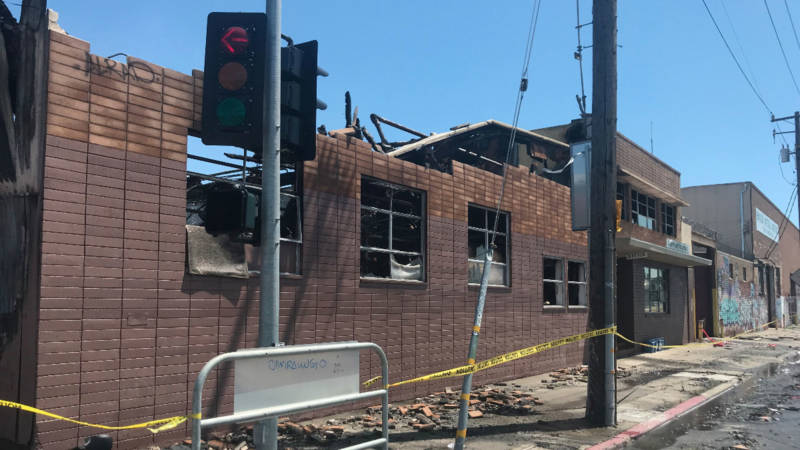David Keenan of Safer DIY Spaces, which emerged after the Ghost Ship fire as a resource for preserving and upgrading artist housing and workspace, is also working with Wolf and M0xy tenants on repairs. “The city, building department—everyone’s been helpful,” he said.
Wolf said the block-long facility is composed of two buildings, and that the one most damaged by the fire will be demolished. He’s working with the property owner, Jason Dreisbach, whose family business provides warehousing services to the ports of Oakland and Richmond, to explore the construction of a new building and restore access to the rest of the complex, noting many tenants are general contractors and skilled laborers.
Meanwhile, at least five tenants affected by the fire have launched crowdfunding campaigns: Skiff, a fabrication business with five employees; 02 Treehouse, an architectural firm focused on treehouses; Rachel Sadd, an artist known as the Crafty Avenger; woodworker Aaron Pirate Cronshey; and Ryan Montgomery, the installation artist behind Geary & Hyde Design.
Dustin Feider of 02 Treehouse said contributions will go to seeking temporary workspace and completing an outstanding project for a client in Seattle. “It’s been a rude awakening to look at rental rates elsewhere,” he said, mentioning that 02 Treehouse often subcontracts with other M0xy tenants. “I’m glad to hear Atticus is on a mission to rebuild.”
M0xy is also accepting donations through its fiscal sponsor Independent Arts and Media.
No one lives at M0xy, Wolf said. Inspired by American Steel, the idea of the below market-rate studio space is to foster tool- and knowledge-sharing among tenants loosely aligned with what he called the industrial arts. At the time of the fire, though, he was working with Community Arts Stabilization Trust, the San Francisco nonprofit, to build artist housing in the neighborhood.
The plan had reached the point of architectural renderings for a potential site across the street. “Now those resources have to go back into the M0xy building,” Wolf said. “We’re at a standstill.”
Artists are particularly susceptible to being displaced from studio space, according to a 2016 report from Oakland Mayor Libby Schaaf’s Artist Housing and Workspace Task Force, due to the city’s lack of commercial rent control or other protections. Most of the 900 local artists who responded to a task force survey indicated their workspace leases are month-to-month.


